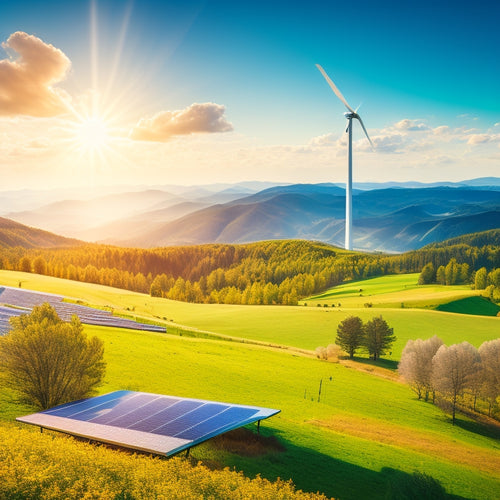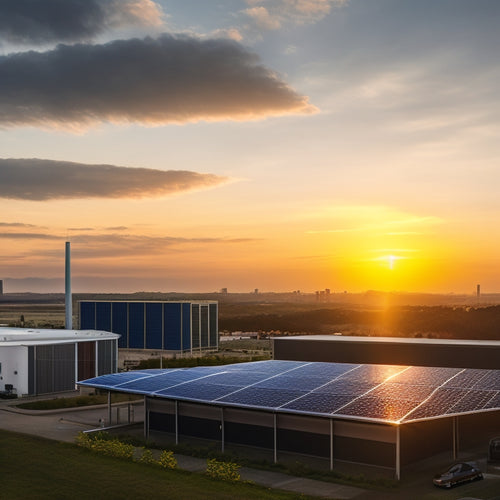
Off Grid Solar System Installation
Share
You're considering an off-grid solar system installation to break free from reliance on the grid and gain energy independence at home. By utilizing renewable energy sources like solar or wind power, you can reduce your energy costs and carbon footprint. A well-designed off-grid system will take into account your daily energy demands, including appliance wattage and usage patterns, to guarantee you have a reliable and efficient power supply. With the right system, you can enjoy zero electricity bills, increased independence, and peace of mind. Now, get ready to learn how to make the most of your off-grid solar system installation.
The Essentials
- Accurate assessment of daily power requirements is crucial for designing an off-grid solar system tailored to specific energy needs.
- Selection of high-efficiency inverters and proper inverter sizing maximize system performance and reduce energy waste.
- Understanding energy usage patterns, including daily habits and seasonal variations, impacts system design and component sizing.
- Deep cycle battery maintenance, including regular inspections and proper charging practices, extends battery lifespan and ensures system reliability.
- Off-grid solar system installation requires evaluation of installation complexity, upfront costs, and energy usage patterns for effective and sustainable power solutions.
Energy Independence at Home
You're taking a significant step towards energy independence at home by considering an off-grid solar system installation.
With renewable energy sources like solar power, you'll be generating electricity on your property, reducing your reliance on the grid.
By utilizing this clean energy, you'll be powering your daily life with a sustainable, reliable, and cost-effective solution.
Renewable Energy Sources
Freedom from reliance on the grid is a tantalizing prospect, and renewable energy sources are the keys that release this independence. As you initiate your off-grid solar system installation expedition, it's crucial to understand the various renewable energy sources at your disposal.
By opting for an off-grid solar kit, you can break free from the constraints of traditional energy sources and enjoy a reliable and sustainable source of energy. Additionally, you'll be able to solve three major problems that come with relying on the grid or generators: high energy costs, noisy and polluting fuel-based systems, and limited access to power in remote areas.
Solar energy, captured through different solar panel types such as monocrystalline, polycrystalline, and thin-film, is a popular choice for off-grid systems. These solar panels convert sunlight into electrical energy, providing a clean and sustainable power source.
Wind energy is another viable option for off-grid systems. Wind turbines convert wind kinetic energy into electrical energy, making it an excellent choice for areas with consistent wind patterns.
Powering Daily Life
As you commence your off-grid solar system installation, powering daily life with energy independence at home becomes a tangible reality. You're about to break free from the grid and utilize the sun's energy to fuel your daily needs.
With a well-designed system, you'll be able to power your appliances, lights, and gadgets using renewable energy. When designing an off-grid solar power system, it's crucial to evaluate the complexity and uncertainty of the installation process, as well as the high upfront costs renewable energy solutions to facilitate a seamless shift to off-grid energy independence.
When choosing solar panel types, evaluate factors like efficiency, durability, and cost. Monocrystalline and polycrystalline panels are popular options, offering high efficiency and long lifetimes. Thin-film panels, on the other hand, are more budget-friendly but less efficient.
The off-grid benefits are numerous. You'll enjoy reduced energy bills, increased energy independence, and a lower carbon footprint.
Plus, with a reliable energy source, you'll have peace of mind knowing you're prepared for power outages or natural disasters. As you power daily life with your off-grid solar system, you'll experience the freedom that comes with being self-sufficient and disconnected from the grid.
Zero Electricity Bills
You'll enjoy reduced energy expenses with your off-grid solar system, as you'll be generating your own clean energy and relying less on the grid.
By adopting renewable energy systems, you'll not only reduce your energy bills but also contribute to a sustainable future.
This means you'll have more control over your energy costs, with no surprise spikes in your monthly bills.
Reduced Energy Expenses
By switching to an off-grid solar system, your energy expenses dwindle considerably, and you can even eliminate electricity bills altogether. This means you'll enjoy significant cost savings, giving you more flexibility in your budget planning. With an off-grid solar system, you're no longer tied to the grid, and you're not at the mercy of rising electricity rates.
Here's a breakdown of how your energy expenses can decrease:
| Energy Source | Monthly Cost | Annual Cost |
| Grid Electricity | $150 | $1,800 |
| Off-Grid Solar | $0 | $0 |
| Diesel Generator | $100 | $1,200 |
| Renewable Energy | $50 | $600 |
As you can see, an off-grid solar system can save you up to $1,800 per year in energy expenses. This translates to more money in your pocket and a significant reduction in your carbon footprint. By going off-grid, you'll not only reduce your energy expenses but also gain energy independence, allowing you to live life on your own terms.
No Monthly Surprises
With an off-grid solar system, you eliminate the uncertainty of monthly electricity bills, freeing yourself from the burden of surprise charges.
You'll no longer worry about fluctuating energy costs or hidden fees, giving you complete control over your energy expenses.
This is achieved through the system's ability to generate electricity independently, relying solely on sunlight as its energy source.
The installation process guarantees that each system component, from the solar panels to the battery bank, is carefully selected and configured to meet your specific energy needs.
As a result, you'll enjoy a predictable and stable energy supply, unaffected by external factors like grid outages or rate hikes.
With zero electricity bills, you'll experience true energy independence, unshackled from the constraints of traditional grid-tied systems.
You'll be able to budget with confidence, knowing exactly how much energy you're producing and consuming, and make the most of your investment.
High-Efficiency Inverter Technology Explained
You'll want to understand the inverter's efficiency ratings, which measure how effectively it converts DC power from your solar panels to AC power for your home.
With the integration of grid management systems, you can guarantee a seamless shift to off-grid energy.
Maximum Power Point Tracking (MPPT) is also vital, as it enables the inverter to optimize energy harvesting from your panels by identifying the ideal operating voltage.
Inverter Efficiency Ratings
Inverter Efficiency Ratings
How efficiently does your off-grid solar system's inverter convert DC power from your solar panels to AC power for your appliances? Inverter efficiency ratings are essential in determining how well your system performs. You want an inverter that can maximize the energy harvested from your solar panels and minimize losses.
Inverter sizing is vital to achieving peak efficiency. A correctly sized inverter guarantees that your system operates within its desired capacity, reducing energy waste and increasing overall efficiency. Efficiency benchmarks vary among manufacturers, but generally, high-efficiency inverters have ratings above 95%.
Here's a comparison of inverter efficiency ratings from various manufacturers:
| Manufacturer | Efficiency Rating | Inverter Model |
|---|---|---|
| SMA | 97.6% | Sunny Island 6048 |
| Schneider Electric | 96.5% | Conext XW+ 6848 |
| OutBack Power | 95.5% | VFX2800A |
When selecting an inverter, look for high-efficiency ratings and consider factors like inverter sizing, ambient temperature, and maximum power point tracking. By choosing an efficient inverter, you can guarantee your off-grid solar system operates at its best, giving you the freedom to live off the grid.
Maximum Power Point Tracking
Optimize your off-grid solar system's performance by utilizing the power of Maximum Power Point Tracking (MPPT), a state-of-the-art technology integrated into high-efficiency inverters.
This advanced solar optimization technique guarantees your system operates at its maximum potential, even under varying environmental conditions. MPPT benefits include increased energy harvest, improved system reliability, and reduced maintenance costs.
As you know, solar panels don't always operate at their maximum power output due to factors like temperature, shading, and mismatch.
MPPT solves this issue by continuously monitoring and adjusting the system's operating point to guarantee maximum energy production. This results in up to 30% more energy generated compared to traditional inverters.
Assess Your Energy Demands
You'll need to understand your energy usage patterns to determine the size of your off-grid solar system. To do this, calculate your daily power requirements by identifying the appliances you'll be using and their respective wattage ratings.
By integrating renewable energy solutions and considering the benefits of off-grid home energy, you can optimize your system for maximum efficiency.
Energy Usage Patterns
As you begin designing an off-grid solar system, understanding your energy usage patterns becomes essential. Your energy consumption is influenced by your lifestyle choices, such as the type of appliances you use, the number of occupants in your home, and your daily habits.
To accurately assess your energy demands, you need to identify your energy-intensive activities and devices. Do you work from home and require a reliable internet connection? Do you have a large family that consumes a lot of power for lighting, refrigeration, and entertainment?
You should also consider your energy usage patterns throughout the day. Are you an early riser who consumes most of your energy in the morning, or do you stay up late and use more power at night?
Additionally, think about your seasonal energy consumption. Do you use more energy for heating in the winter or cooling in the summer?
Daily Power Requirements
Calculating your daily power requirements is a critical step in designing an off-grid solar system that meets your unique energy needs. You'll need to determine how much energy you use daily to select the right solar panel types and energy storage solutions.
Start by identifying your essential appliances and devices, such as lights, refrigerators, and computers, and their respective power ratings. Calculate the total watt-hours (Wh) required to power each appliance per day. Add up the total Wh to get your daily power requirement.
Consider your energy usage patterns, including peak hours and seasonal variations. This will help you determine the required battery capacity and solar panel array size. For example, if you need 2,000 Wh/day, you may require a 4 kW solar panel array and a 12 kWh energy storage system.
Accurately evaluating your daily power requirements guarantees you design a system that can meet your energy demands, providing you with the freedom and independence you desire. By doing so, you'll avoid undersizing or oversizing your system, saving you time, money, and resources in the long run.
Longer Battery Life Guaranteed
You'll need to implement deep cycle maintenance to guarantee your off-grid solar system's batteries last as long as possible.
This involves regularly checking and adjusting the electrolyte levels, cleaning the terminals, and monitoring the charging and discharging cycles.
Deep Cycle Maintenance
Your deep cycle batteries are the backbone of your off-grid solar system, and regular maintenance is vital to extending their lifespan. To guarantee optimal battery care, establish a maintenance schedule that includes regular performance monitoring.
Check water levels, clean terminals, and inspect storage solutions to prevent corrosion. Proper charging practices are also essential, as excessive discharge rates can reduce lifespan. Be mindful of temperature effects, as high temperatures can accelerate degradation.
To assure longer battery life, monitor your battery's state of charge, voltage, and temperature. Schedule regular equalization charges to prevent sulfation.
When storing batteries, keep them in a cool, dry place, away from metal objects. Avoid deep discharging, as it can reduce lifespan.
By following these guidelines, you'll be able to extend the life of your deep cycle batteries, guaranteeing your off-grid solar system remains reliable and efficient.
Frequently Asked Questions
Can I Install an Off-Grid Solar System Myself?
You can attempt a DIY solar installation, but be aware that you'll face installation challenges, such as ensuring electrical safety, optimizing panel angles, and configuring battery banks, which may require specialized knowledge and skill.
How Long Does an Off-Grid Solar System Installation Take?
When planning an installation, you'll need to contemplate the installation timeline, which depends on the system's complexity. Generally, a simple setup takes 1-3 days, while more intricate systems can take up to several weeks or even months to complete.
Can I Add More Solar Panels to My Existing System?
As you gaze up at your existing solar array, imagine adding more panels to utilize the sun's untapped power; yes, you can expand your system, but verify solar panel compatibility and consider system expansion considerations to avoid a mismatched, inefficient setup.
Will My Appliances Work With an Off-Grid Solar System?
You'll need to verify your appliances are compatible with DC power or invest in an inverter for AC conversion, prioritizing energy efficiency to optimize performance, as not all appliances are created equal regarding off-grid solar system compatibility.
Are Off-Grid Solar Systems Compatible With Generators?
You're wondering if your generator can team up with a renewable energy source; yes, you can integrate a generator with a hybrid system, allowing you to utilize solar power while having a backup plan for when the sun doesn't shine.
Final Thoughts
By going off-grid with a solar system installation, you'll enjoy energy independence at home and say goodbye to zero electricity bills. With high-efficiency inverter technology, you'll maximize your energy harvest. After evaluating your energy demands, you can rest assured of a longer battery life. For instance, the Johnsons, who installed a 5 kW off-grid solar system, now power their rural farmhouse without relying on the grid, enjoying significant savings and peace of mind.
Related Posts
-

Renewable Energy Solutions to Reduce Your Carbon Footprint
To reduce your carbon footprint, adopting renewable energy solutions is key. Using solar panels or wind turbines can ...
-

Top 10 Off Grid Camping Gear Must-Haves
When you're off-grid camping, the right gear is crucial for a smooth expedition. Start with a durable, weather-resist...
-

Advantages of Commercial Solar Battery On-Site Storage
By investing in a commercial solar battery on-site storage system, you can greatly reduce your energy grid dependence...


